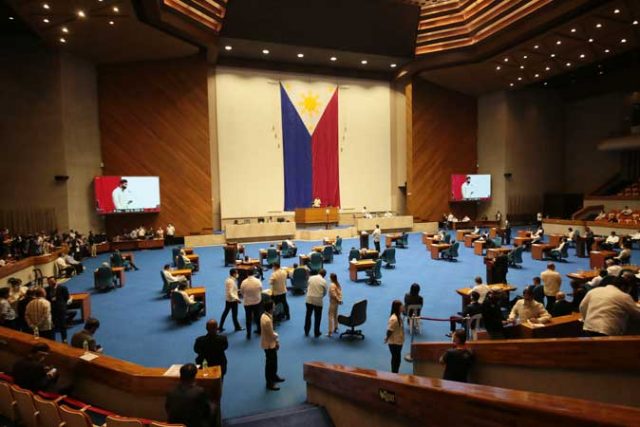
BusinessWorld | May 31, 2021 | 12:33 am
BUSINESS GROUPS are calling for the urgent passage of pending economic bills before Congress’ sine die adjournment this week.
However, the House of Representatives said it will fast-track the approval of priority bills, but particularly the Bayanihan to Arise as One Act (Bayanihan III) and the economic Charter change resolution, before adjournment on June 4.
“We resume session on Monday with a full plate of priority bills scheduled for plenary deliberation before we adjourn sine die this week,” Leyte Representative and chairman of the House Committee on Rules, Martin G. Romualdez, said in a news release on Sunday.
“Speaker Lord Allan Velasco wants to place in the front burner the passage of the proposed Bayanihan to Arise as One Act or the Bayanihan III and the economic Charter change under Resolution of Both Houses (RBH) No. 2 on third and final reading,” he added.
Business leaders, on the other hand, want Congress to approve key economic measures this week.
Certified urgent by President Rodrigo R. Duterte, proposals to amend the Public Service Act (PSA), the Foreign Investments Act of 1991, and the Retail Trade Liberalization Act of 2020 (RTLA) have yet to hurdle Congress.
The House versions of the bills have been approved on third reading, while the Senate is still deliberating its own versions of bills seeking to amend the PSA and the Foreign Investments Act.
The three bills are seen as tools to aid recovery from the effects of the pandemic on the economy by attracting investments and jobs.
“This is the right time to pass the economic bills because we strongly believe that this would lead to increased foreign investment. That would be obviously a help and support to accelerating the economy,” British Chamber of Commerce of the Philippines Executive Director Chris Nelson said in an interview by phone on Saturday.
“Time is of the urgency… what we want to see is for them to be passed as soon as possible so we can communicate to investors — here is a very progressive move. We’re competing with other countries and it’s great to try and promote the Philippines and the Philippine advantages of the people and skills backed up by these laws.”
The Senate last week approved a measure that would set foreign retailers’ minimum paid-up capital at P50 million or around $1 million should they seek to enter the market, lower than the current requirement of $2.5 million.
The two chambers will convene a Bicameral Conference Committee to reconcile their versions that could amend the RTLA. While foreign business groups support the House version setting a lower minimum paid-up capital of $200,000, local retailers support the Senate version, which they said would keep smaller businesses from losing out.
John Forbes, senior advisor of the American Chamber of Commerce of the Philippines, said that the group is hoping for the passage of amendments to the RTLA.
“(The amendment) would allow more foreign retail firms to invest as they are doing in Vietnam, for example, where Korean-owned shops and restaurants supported over four million Korean tourists in 2019,” he said in a mobile message on Friday.
“Allowing the same here could eventually double the two million Korean tourists to the Philippines in 2019.”
Several business groups on Saturday released a statement urging Congress to immediately pass bill that would amend the PSA, which would change the definition of public utilities to allow more foreign investment in telecoms.
“It will put in place a legal framework that will encourage more foreign investments in the Philippines and will foster strong competition that will benefit the consumers, boost job creation, and expand our economy while at the same time safeguarding our national interests against foreign domination of critical infrastructure,” the groups said.
But the business groups — which include the Financial Executive of the Philippines, the Management Association of the Philippines, and Makati Business Club — expressed concerns about some provisions in the PSA bill, including a reciprocity clause requiring similar treatment by the home country of the foreign investor before it can be allowed to own more than 40% of the capital of public services engaged in critical infrastructure.
It also criticized a provision that oversees investments by foreign-state owned enterprises, which the groups said can be interpreted as “prohibiting sovereign wealth funds from investing in public service classified as critical infrastructure.”
Nabil Francis, president of the European Chamber of Commerce of the Philippines, said that the chamber is calling for the swift passage of the three bills.
“The speedy implementation of these reforms, particularly the House-proposed versions, will usher in foreign direct investments, spur economic growth and generate jobs which are crucial to improve the overall competitiveness and economic health of the country,” he said in a mobile message on Friday.
Foreign business groups in a statement on Sunday also supported the passage of House Bill 8910 or the Open Access in Data Transmission Act.
“The Open Access Act will provide a competitive policy and regulatory framework that lowers the barriers and cost to enter the data transmission market. This will significantly improve the data transmission services,” the groups said.
Represented by foreign chambers including the United States, Canada, Japan, and Europe, the groups, however, asked Congress to reconsider the retention of the franchise requirement for international cable landing stations, which they consider to be a barrier to entry of more players in the broadband sector.
“This will delay lowering the cost of broadband and providing a fuller range of digital access for consumers and citizens throughout the country,” the groups said. — with Bianca Angelica D. Añago
Read the original article here.




























